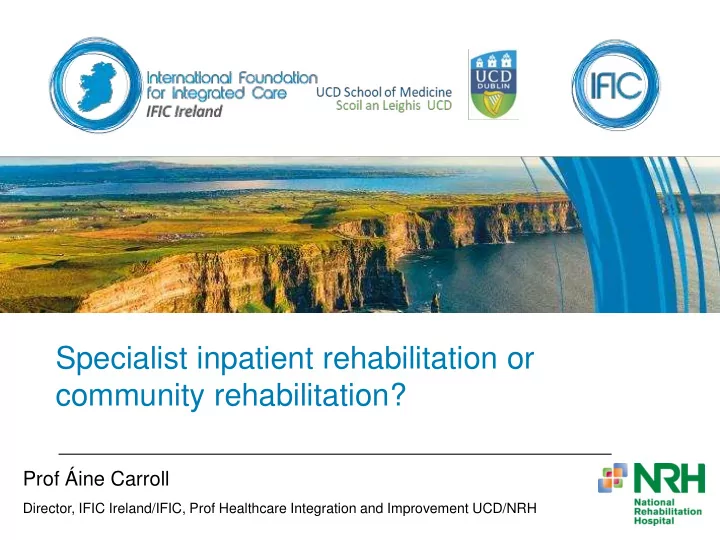

Specialist inpatient rehabilitation or community rehabilitation? Prof Áine Carroll Director, IFIC Ireland/IFIC, Prof Healthcare Integration and Improvement UCD/NRH
Answer? • Both and.. – Given the diversity of presentation and rehabilitation needs, different patients require different types of services. – Moreover, the same patient will require different services at different stages in their recovery – And we still don’t know the full extent of the issues that will require rehabilitation!
What do we even mean by rehabilitation?
What we don’t need • Post-COVID-19 rehabilitation services to further fragment the scarce rehabilitation services that are available
A ‘new’ paradigm • Need to move from: – Biomedical, disease-focused approach with Rehabilitation as occasional add-on after medical process • To: – Holistic, patient-centred approach with Rehabilitation fully integrated with medical care at all times (i.e. in parallel )
What is rehabilitation? An empirical investigation leading to an evidence-based description Wade, D.T., 2020. What is rehabilitation? An empirical investigation leading to an evidence-based description. Clinical rehabilitation, 2020, Volume 34, Issue 5
Rehabilitation after COVID-19: an evidence-based approach
Rehabilitation care pathways in the wake of Covid-19
Factors affecting the rehabilitation response
Coordinated networks Rich connectivity! • Rehabilitation services planned and delivered in coordinated networks • In view of the infectious nature of Covid-19, Covid-positive and Covid-negative streams are required especially within the step-down/early rehabilitation stage after patients first leave the ICU setting. • Close integration of hospital and community services with collaborative commissioning arrangements. • Primary care teams supported by outreach activity from secondary services including (and more besides); a) Cardio-pulmonary rehabilitation b) Sports and exercise medicine c) Neurorehabilitation and neurological disability services d) Vocational rehabilitation. • Specialist rehabilitation should be delivered by coordinated multi/inter-disciplinary rehabilitation teams • Facilities that include specialist equipment, electronic assistive technology and orthotics. • Joined up multi-agency long-term care from health, social services and the 3rd sector where appropriate.
Both and.. • Rationalisation and reorganisation of services for people into a coherent, comprehensive rehabilitation service from first contact with healthcare • Provision of service in all settings from intensive care through hospitals and care homes into the wider community, in parallel with medical services • All ages and conditions • Full integration between mental health services and rehabilitation services • Recognise that all rehabilitation requires expert knowledge and skills
Concluding thoughts • COVID-19 has challenged all healthcare systems and specialties , including rehabilitation. • It’s not going away any time soon and we will see the consequences for many years to come. • We have seen unprecedented innovation and adoption over the last number of months that we wouldn't have dreamed of pre-COVID • “Rehabilitation” and the need for it has received great attention but it has been siloed and fragmented • If we come together in networks of rehabilitation in partnership with patients and families and community organisations, we might really achieve something magical
integratedcarefoundation.org/ificireland @IFICinfo IFICIreland@integratedcarefoundation.org Aine.carroll@ucd.ie
Recommend
More recommend